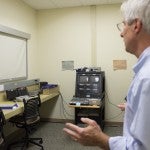Our Research
 The goal of our research is to understand the multifaceted influences on early psychological development, especially in early childhood. In our studies of the growth of emotion understanding and emotion self-regulation, conscience development, understanding of self and others, prosocial behavior, and related topics, we seek to understand the convergence of influences within and surrounding the developing child. Our studies devote attention, for example, to the influence of the warmth and security of the parent-child relationship, the child’s own efforts to comprehend her or his psychological experience, the broader emotional climate of the child’s life, neighborhood processes, and the sociodemographic context of family life. We invite you to learn more about this work and, if interested, to become involved yourself.
The goal of our research is to understand the multifaceted influences on early psychological development, especially in early childhood. In our studies of the growth of emotion understanding and emotion self-regulation, conscience development, understanding of self and others, prosocial behavior, and related topics, we seek to understand the convergence of influences within and surrounding the developing child. Our studies devote attention, for example, to the influence of the warmth and security of the parent-child relationship, the child’s own efforts to comprehend her or his psychological experience, the broader emotional climate of the child’s life, neighborhood processes, and the sociodemographic context of family life. We invite you to learn more about this work and, if interested, to become involved yourself.
Recent Projects
Development of Emotion Understanding Study
This study examines developmental changes in children’s emotion regulation skills as enacted with a close friend. First and third grade children shared in a series of peer interaction tasks with their best friends in which the tasks were structured to lead children to conflicting goals, and we were particularly interested in how children of this age anticipated emotion regulation and enacted it in the context of interaction with a close friend.
Early Social Understanding Study
This is a short-term longitudinal study investigating the influence of relational factors, such as the quality of mother-infant interaction and maternal socialization processes, on young children’s interactions with an unfamiliar adult in a variety of novel social situations. Mothers and their 12-month-olds participated in the first wave of the study, and they returned six months later for a follow-up visit.
Preschoolers’ Emotional Responding and Communication Study
This study is a short-term longitudinal study examining the development of early moral character in preschool-age children and maternal and relational predictors of individual differences in these sociomoral behaviors. Children and their mothers who participated in a lab visit during their 4th year were invited back to the lab to participate in a follow-up visit approximately 1.5 years later. During the follow-up visit, children’s prosocial and early conscience behaviors, such as compliance and behavioral inhibition, were observed. This allows us to assess consistency within and across these early moral behaviors along with maternal and family predictors of individual differences over time.
Toddler Social Understanding Study
This study investigates the role of several relational influences and individual differences on 18-to 20-month-olds’ behavior in social interactions. We are interested in how toddlers’ temperament and aspects of the mother-child relationship, including maternal mind-mindedness, attachment security, and maternal discourse regarding the causes of emotions, influences toddlers’ prosocial and helping behavior in response to emotional and non-emotional cues.
Preschoolers’ Emotional Development Study
This study examines sources of individual differences in the quality of mothers’ conversations with their children about emotion, and how these conversations influence preschool children’s emotion knowledge of self and other, and emotion regulation.
More Photos of our Lab
- Our welcome room
- One of our observational playrooms
- Observational hub for digital recording
- Another research playroom




